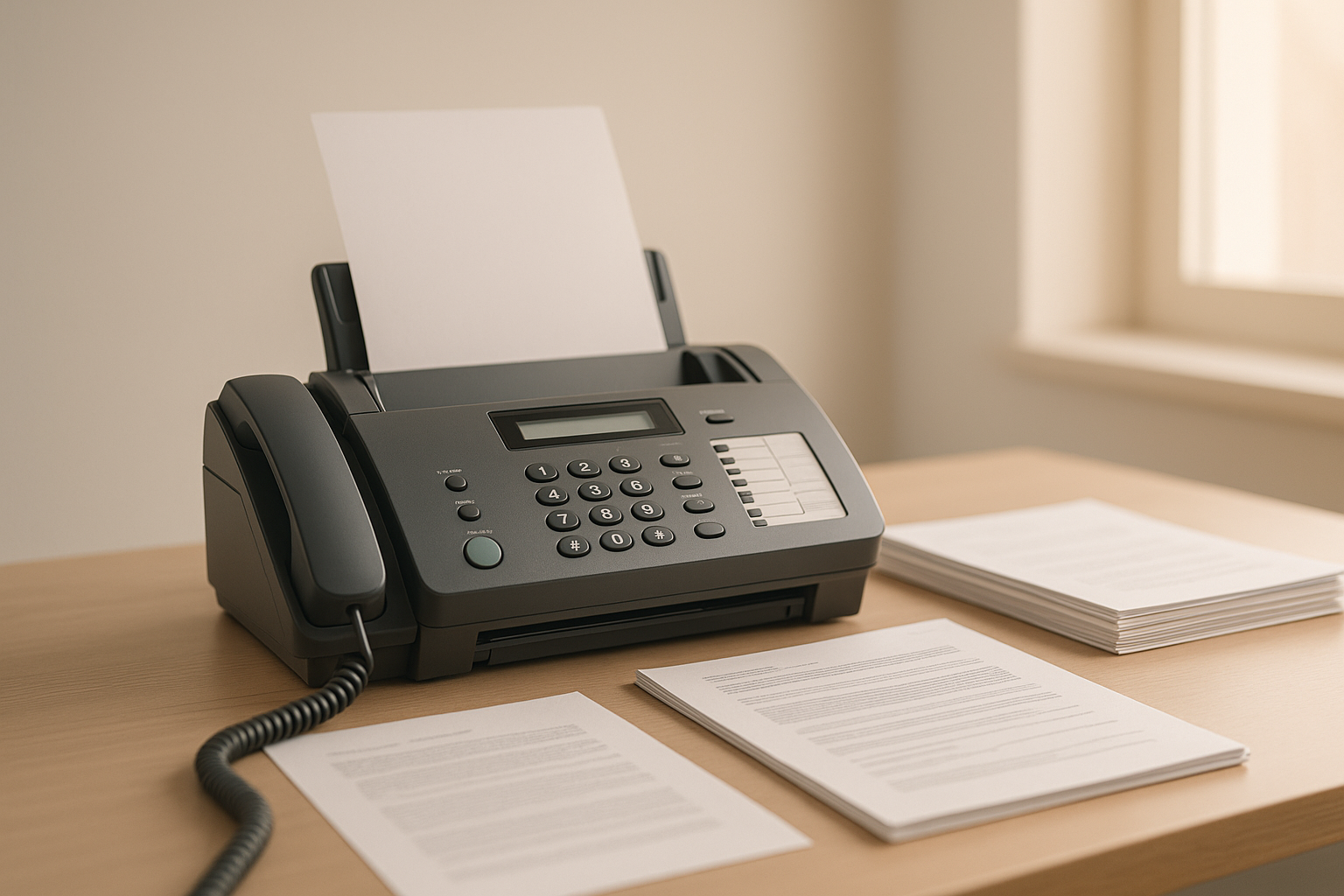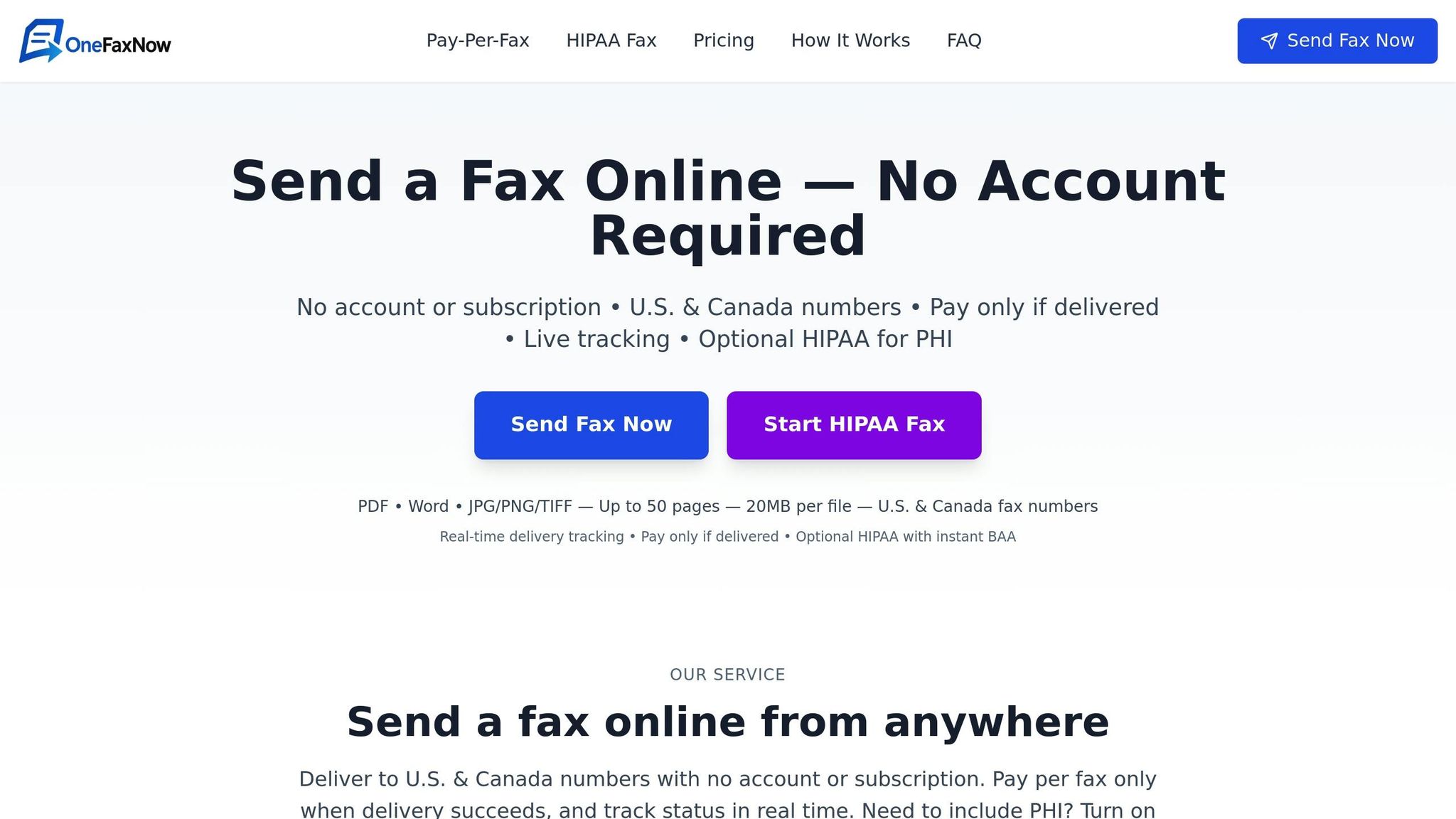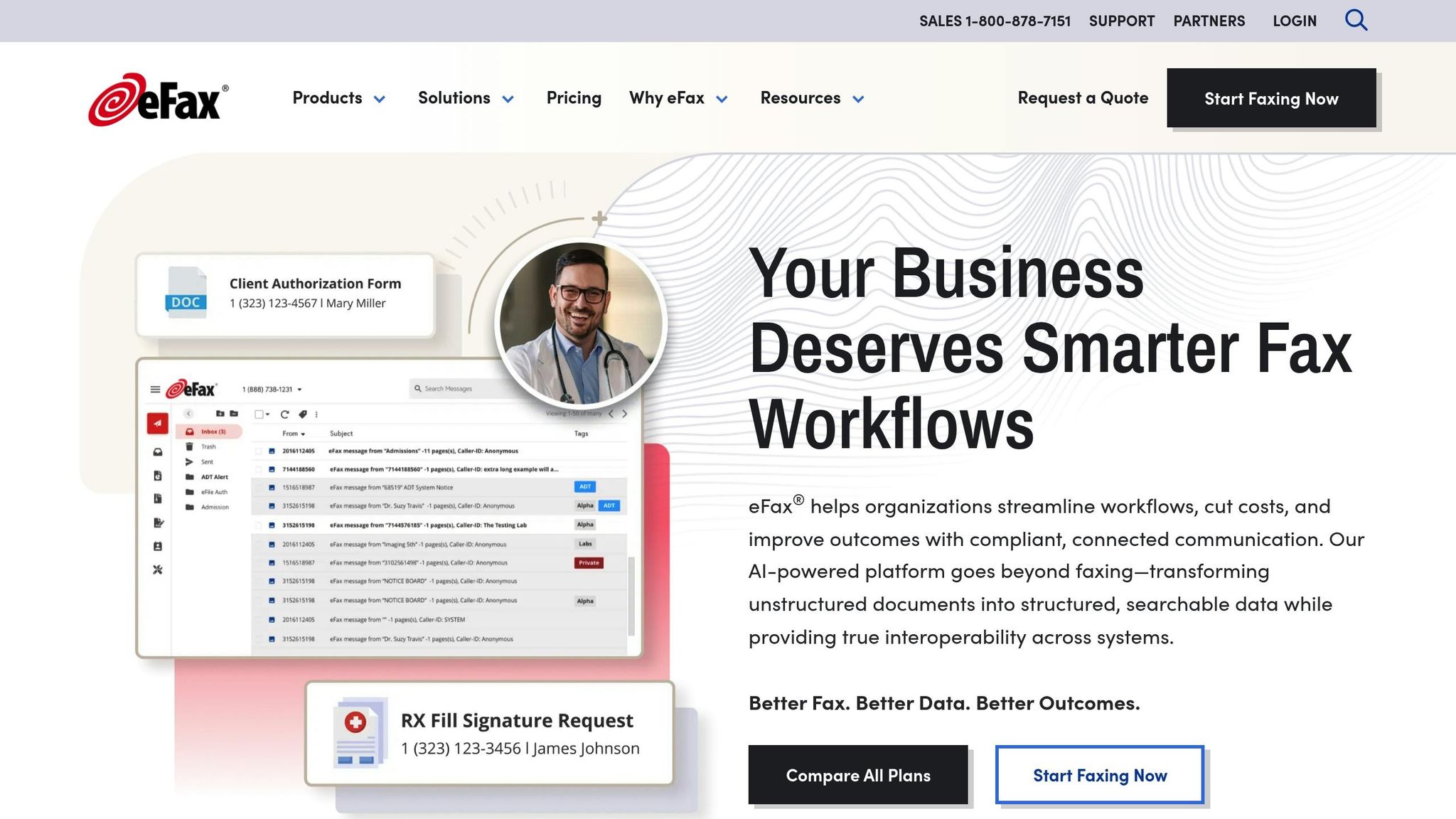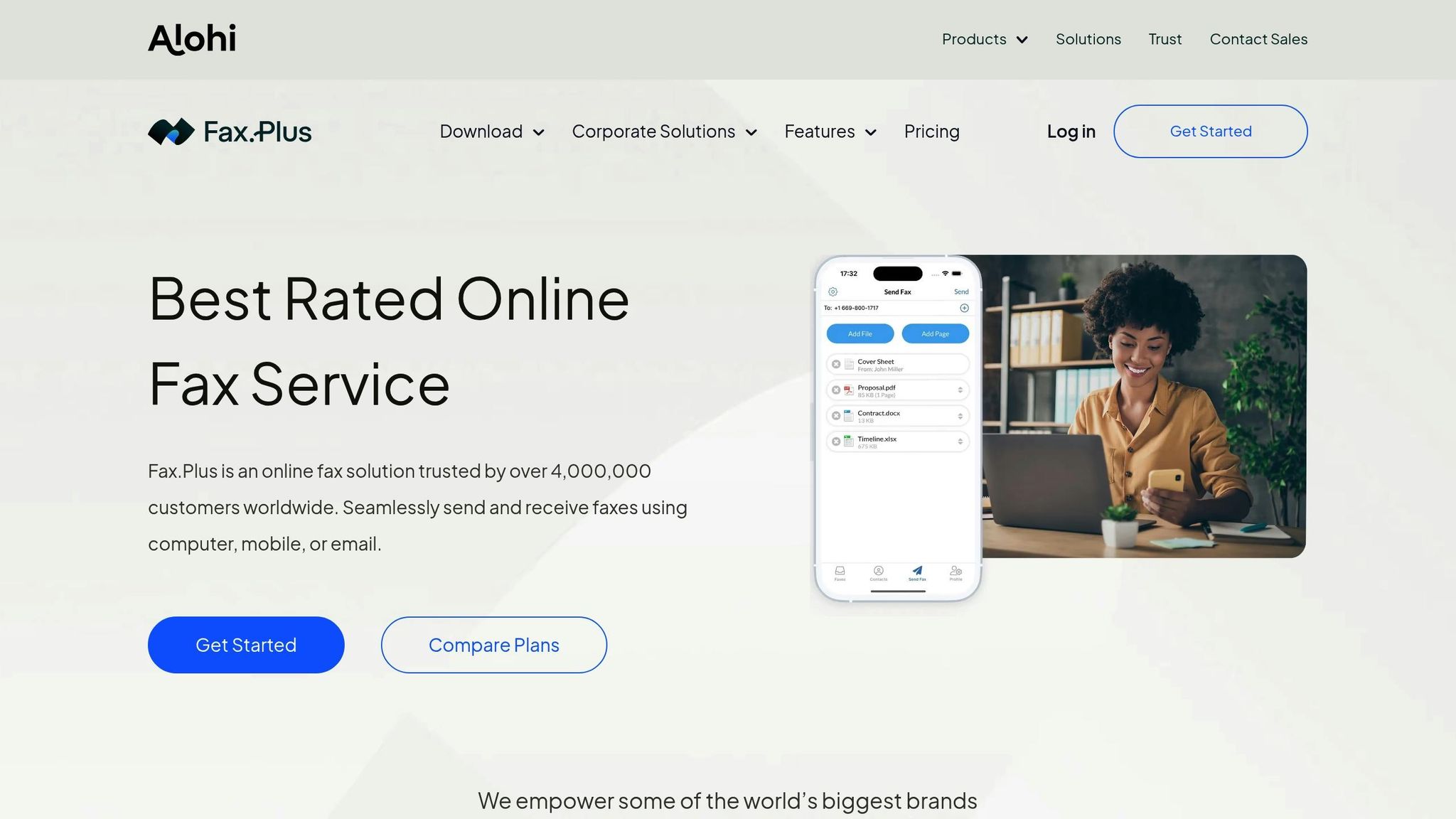Court Fax Filing Rules by State: What's Allowed in 2025
Explore the fax filing rules by state for 2025, highlighting key regulations, permitted methods, and the importance of compliance.

Court Fax Filing Rules by State: What's Allowed in 2025
Fax filing remains a key part of the U.S. court system in 2025, despite the rise of electronic filing systems. Each state has its own rules for fax submissions, making it essential to understand local requirements. Here's a quick overview of key state regulations:
- California: Rule 2.304 governs fax filings, requiring a specific cover sheet (MC-005) and adherence to local court rules.
- New York: Fax filings often need prior court approval, especially for emergency motions and applications.
- Texas: Rules vary by court, with some allowing fax filings for specific cases after initial citations are served.
- Florida: Fax filings are not accepted; documents must be submitted via the eFiling Portal.
- Illinois: Faxing is prohibited statewide; all filings must go through the Odyssey File & Serve system.
For legal professionals, choosing the right fax service is equally important. Services like OneFaxNow provide pay-per-use options with HIPAA compliance for sensitive documents, while subscription services like eFax and Fax.Plus cater to frequent users.
Key takeaway: Fax filing rules differ greatly by state, so always check local court requirements to ensure compliance. For occasional filings, pay-per-use services like OneFaxNow offer a cost-effective and secure solution.
State-by-State Court Fax Filing Rules
Court fax filing rules differ by state, so staying informed about local requirements is key to ensuring compliance. For instance, California's rules are explicitly outlined under Rule 2.304, but specifics like page limits, timing, and submission protocols are often determined by local courts rather than statewide mandates. Here's a breakdown of fax filing guidelines for several states, along with a comparison table to help you navigate these requirements.
California:
California Rule 2.304 governs fax filings, requiring the use of an MC-005 cover sheet and adherence to specific formatting rules. Fax filings are accepted for a wide range of documents, but details can vary by jurisdiction. [Last verified: October 2, 2025]
New York:
In New York, the Uniform Rules for Trial Courts permit fax filings for select document types, often requiring prior court approval. These filings are typically reserved for emergency applications and certain motions. [Last verified: October 2, 2025]
Texas:
Texas employs a mixed approach, where local rules and the nature of the document determine whether fax filings are accepted. Some courts allow fax submissions under specific conditions, while others stick to traditional filing methods. [Last verified: October 2, 2025]
Florida:
Florida takes a more flexible stance on fax filings, allowing many court documents to be submitted without prior approval. [Last verified: October 2, 2025]
Illinois:
Illinois' fax filing procedures vary widely by county and court type. While some jurisdictions have adopted electronic filing systems, others still accept faxed documents. [Last verified: October 2, 2025]
Here’s a quick comparison of key parameters for these states:
| State | Page Limit | Prior Approval Required | Original Document Filing | Emergency Filings |
|---|---|---|---|---|
| California | Varies by jurisdiction | Varies by jurisdiction | Varies by jurisdiction | Varies by jurisdiction |
| New York | Varies by jurisdiction | Often required | Varies by jurisdiction | Case-by-case basis |
| Texas | Varies by jurisdiction | Varies by jurisdiction | Varies by jurisdiction | Per local rules |
| Florida | Varies by jurisdiction | Generally not required | Varies by jurisdiction | Per local rules |
| Illinois | Varies by jurisdiction | Varies by jurisdiction | Varies by jurisdiction | Varies by jurisdiction |
Some states also impose timing requirements for receipt and mandate specific cover sheets. Checking local court rules before filing is essential to avoid compliance issues.
Choosing the right fax service is equally important. A reliable service that provides clear transmission records and adheres to local filing protocols can make the process smoother and ensure your submissions meet all necessary standards.
1. California Rule 2.304
This section explains the key aspects of Rule 2.304, expanding on the earlier state overview. California Rule 2.304 outlines the rules for filing documents via fax in state courts. However, the specific details - like which documents are eligible and the requirements for submission - are determined by each court's local rules. It's always a good idea to check those local rules to ensure you're following the correct process.
Permitted Filing Methods
In California, many courts allow fax filings for documents such as motions, responses, and administrative paperwork. Some courts may require additional elements, like a cover sheet or specific formatting, so make sure to double-check these details. To avoid delays or rejections, ensure the faxed documents are clear and legible. For urgent matters - like ex parte motions or temporary restraining orders - courts may offer faster processing if certain conditions are met. Always verify these requirements with the court handling your case.
Page Limits
There isn’t a statewide page limit for fax filings under Rule 2.304. Instead, local courts set their own restrictions on how many pages can be submitted by fax. If your document exceeds the limit, you’ll need to use another filing method, such as electronic or in-person submission. Reviewing the local court's rules will help you stay within any page limitations.
Consent/Notice Requirements
In addition to page limits, following notice procedures is crucial. All parties involved must receive proper notice of the filing. In emergency situations, courts might waive the notice requirement if you can show good cause. Even so, you’re still responsible for ensuring that all necessary recipients receive copies of the faxed documents according to the court's procedural rules.
Pricing and Costs
The costs associated with fax filings can vary depending on the court. Filing fees and transmission charges may apply, and you could face additional costs if your fax is rejected or needs corrections. If you’re using an online fax service, check their pricing carefully - fees are often charged per page, which can add up quickly.
2. New York State Fax Filing Rules
In New York, filing court documents via fax follows different rules depending on the court. Some courts allow fax filings without prior approval, while others require permission beforehand.
Permitted Filing Methods
The New York Court of Claims allows fax submissions for documents, including claims, without needing prior approval[1]. Any papers meant for the Clerk of the Court of Claims can be sent via fax[1].
However, for the Supreme Court and County Court, you must first get approval from the assigned justice before submitting anything by fax[2]. Once permission is granted, make sure to account for any page limits and notice requirements specific to the court.
Page Limits
For the Court of Claims, fax filings are capped at 50 pages in total[1]. Other courts in New York don’t have a set page limit, but it’s a good idea to confirm any restrictions directly with the court.
Consent and Notice Requirements
When filing via fax with the Court of Claims, you must include a detailed cover sheet. This cover sheet should provide the following information:
- The nature of the document
- The claim number (if assigned)
- The name and address of the filing party or attorney
- A contact phone number and fax number for return communication
- The total number of pages (including the cover sheet)
- Payment confirmation or receipt details, if applicable[1]
For Supreme Court and County Court filings, prior judicial approval is required before using fax[2].
HIPAA Compliance
New York courts enforce strict confidentiality rules. Under Section 202.5(e), any documents submitted for filing must exclude or redact sensitive personal information[2]. This includes:
- Taxpayer identification numbers (except the last four digits)
- Dates of birth (only the year should be included)
- Full names of minors (use initials instead)
- Financial account numbers (only the last four digits or letters should appear)[2]
Pricing and Costs
Fax filing a claim with the Court of Claims costs $50.00[1]. If needed, you can submit an application for a fee waiver alongside your claim[1]. For other courts that require prior approval, fees depend on the document type and case, though standard court fees will still apply.
3. Texas Fax Filing Guidelines
Texas has specific rules for fax filing, which can differ based on the type of case and its stage.
Permitted Filing Methods
For small claims cases in Texas, fax filing is allowed only after the initial citation has been served to the defendant. This guideline is outlined in Rule 501.4 of the Texas Rules of Civil Procedure[3]. Once the citation is served, fax filing can be used for any further documents.
Accepted filing methods include:
- In-person delivery
- Courier service
- Email[3]
However, not all judicial bodies in Texas accept fax filings. For example, the State Commission on Judicial Conduct explicitly prohibits complaints via fax, as well as through online forms, telephone, or email[4].
"The Commission does not accept complaints via our online 'Contact Us' form, by telephone, fax, or email." - State Commission on Judicial Conduct[4]
Page Limits
There isn’t a statewide page limit for fax filings in Texas. Instead, individual courts or judicial bodies may set their own restrictions. For instance, the State Commission on Judicial Conduct limits submissions to a maximum of 25 pages[4].
Important Update
It's also worth noting that recent legal updates may impact filing practices. According to the Texas State Law Library, many new Texas laws went into effect on September 1, 2025. As of October 2, 2025, their guidance is still being reviewed and updated[3]. Always check the latest court rules before proceeding with a filing.
4. Florida Court Fax Filing Regulations
In Florida, the state's highest court has a clear rule: faxed or emailed filings for court documents are not accepted. Instead, all submissions must go through a designated electronic filing system.
Permitted Filing Methods
If you're represented by an attorney, all pleadings must be submitted through the Florida Courts eFiling Portal. Once a document is filed electronically, paper copies are no longer required or accepted[5].
Consent/Notice Requirements
Florida has streamlined its process by eliminating traditional consent and notice requirements for filings. The eFiling Portal takes care of ensuring compliance with the state's formatting and delivery standards.
It's essential for filers to understand how the eFiling Portal works. For step-by-step instructions and detailed guidance, check out the state-specific eFiling guidelines available in our additional resources.
5. Illinois Fax Filing Requirements
Illinois stands out with its strict requirement for electronic filing, moving away from traditional fax submissions entirely. The state mandates the use of Odyssey File & Serve for nearly all case filings, setting a clear standard for attorneys and litigants.
Permitted Filing Methods
In Illinois, fax filing is off the table. Attorneys are required to submit all documents through the Odyssey File & Serve system, a rule that became mandatory in most counties starting in 2019. This platform is the cornerstone of Illinois' court filing process, ensuring consistency and accessibility.
For individuals representing themselves (pro se litigants), filings can be done either in person at the clerk's office or electronically via the same system, provided they register for access. Fax submissions are not an option for these parties either. In emergency situations, alternative filing methods may be allowed, but only with prior approval from the court.
Consent/Notice Requirements
Illinois' electronic filing system integrates seamlessly with service protocols. When documents are filed electronically, the Odyssey File & Serve system automatically handles service for represented parties. For those without legal representation, service is carried out using traditional methods like mail or personal delivery.
HIPAA Compliance
When filings involve protected health information, Illinois adheres to federal HIPAA regulations, regardless of the method of submission. The Odyssey system is designed to safeguard sensitive information with features like restricted access and audit trails. Attorneys dealing with medical records or health-related evidence must ensure their submissions comply with both HIPAA and court rules. The platform also supports sealed filings when confidentiality is required.
Illinois' commitment to electronic filing reflects a broader trend toward secure and efficient court document management, aligning with the push for modernized legal processes nationwide.
6. OneFaxNow - Send a Fax Online

OneFaxNow offers a simple, no-account-needed solution for pay-per-fax court filings, making it a great option for quick and hassle-free document submissions. The platform supports faxing to courts in states where this method is still allowed. Let’s break down its key features and pricing to see why it’s a solid choice for legal filings.
Supported Filing Methods
OneFaxNow works with a variety of legal document formats, including PDF, DOCX, TXT, JPG, and PNG, faxing them directly in their original format. The entire process is browser-based, so you won’t need a physical fax machine or any special software. To ensure reliability, the service provides real-time tracking via a job ID and email link, and it automatically retries failed transmissions up to three times.
Page Limits and Plans
Each court filing can include up to 50 pages per transmission, with two pricing tiers available:
- Lite Plan: Covers 1–10 pages.
- Standard Plan: Covers 11–50 pages.
Keep in mind that cover pages count toward the total page limit.
HIPAA Compliance for Sensitive Documents
If you're dealing with Protected Health Information (PHI), OneFaxNow offers an optional HIPAA compliance add-on. This includes features like instant BAA generation, encrypted transmissions, an audit dashboard, advanced PHI deletion, and secure delivery.
Pricing Breakdown
OneFaxNow operates on a pay-per-fax model, ensuring clear, upfront pricing. You’re only charged if the fax is successfully delivered - no delivery, no charge. Here’s the pricing structure:
| Plan | Pages | Standard Price | HIPAA Add-On | Total with HIPAA |
|---|---|---|---|---|
| Lite | 1–10 pages | $3.50 | +$3.00 | $6.50 |
| Standard | 11–50 pages | $5.00 | +$5.00 | $10.00 |
Uploads are limited to 20 MB per transmission. Files exceeding this size will need to be split into smaller submissions.
Why Choose OneFaxNow for Court Filings?
OneFaxNow’s straightforward, no-account-required setup makes it an excellent choice for legal professionals. The success-based billing ensures you only pay when your fax is delivered, while features like real-time tracking and automatic retries provide added reliability. For those handling sensitive health-related documents, the optional HIPAA add-on ensures secure and compliant transmissions.
Primary CTA: Send a Fax Online - No Account Required
Secondary CTA: Safeguard your legal documents with OneFaxNow’s HIPAA-compliant mode.
sbb-itb-0df24da
7. eFax

eFax operates on a subscription model designed for users with consistent faxing needs.
Permitted Filing Methods
With eFax, you can send documents in widely used formats like PDF, DOC, DOCX, TXT, RTF, JPG, and PNG. Faxes can be sent through email-to-fax, the web portal, or mobile apps. However, the platform does not include features specifically designed for court filing purposes.
Page Limits
eFax does not provide public information about its monthly page limits or per-transmission restrictions. If you need detailed information about these limits, reaching out to eFax directly is recommended.
HIPAA Compliance
For healthcare-related communications, eFax offers HIPAA-compliant options. These include encrypted transmissions, secure storage, and Business Associate Agreements. However, specific details regarding availability or additional costs for these options are not disclosed publicly.
Pricing and Costs
eFax does not share detailed pricing or fee information openly.
Why OneFaxNow for Court Filings: OneFaxNow stands out for legal professionals who need to file court documents occasionally. Its pay-per-fax model eliminates long-term commitments, offering success-only billing and real-time tracking. This makes it a practical alternative to subscription-based services like eFax for ad hoc court filing needs.
8. Fax.Plus

Fax.Plus operates on a tiered subscription system, offering a limited free plan alongside its paid options.
Permitted Filing Methods
With Fax.Plus, you can send files in PDF, DOC, and DOCX formats through its web portal, mobile app, or via email-to-fax.
Page Limits
The free plan includes 10 total pages for the entire lifetime of the account - not a monthly allowance [6][7][8]. Once those 10 pages are used, users must either upgrade to a paid subscription or purchase extra pages at $0.20 each [6].
For paid plans, monthly page allowances are included, but additional pages come with overage charges. For instance, the Basic plan offers 200 pages per month, with any extra pages costing $0.10 each [6]. Higher-tier plans come with larger monthly limits but still charge for exceeding the allotted pages.
HIPAA Compliance
If you need HIPAA compliance, it’s only available under the Enterprise plan [6][7]. This makes the Enterprise plan a necessity for legal professionals handling healthcare-related documents.
Pricing and Costs
Fax.Plus pricing includes some potential extra charges - such as fees for cover pages, failed faxes, or transmissions that take over one minute per page [7].
- Basic Plan: Costs $8.99 per month or $83.99 annually (equivalent to $6.99 per month, offering a 22% savings) [6][8].
- Premium Plan: Priced at $17.99 per month [6].
- Annual subscriptions across all tiers provide cost savings compared to paying month-to-month [6][7].
These subscription options, combined with potential hidden fees, differ from simpler pay-per-fax services.
Why OneFaxNow Stands Out for Court Filings
Unlike Fax.Plus, OneFaxNow’s pay-per-fax model removes the need for ongoing subscription fees or surprise charges. Additionally, it provides HIPAA compliance without requiring an expensive enterprise-level plan. This makes it a practical choice for legal professionals handling sensitive documents or occasional multi-page court filings.
9. MetroFax

MetroFax is a business fax service designed with subscription plans tailored for transmitting legal documents.
Permitted Filing Methods
MetroFax supports a variety of file formats, including PDF, DOC, DOCX, and multiple image types. You can send faxes through their web interface, mobile app, or email-to-fax feature, making it adaptable to different workflows often used by legal professionals.
Page Limits
MetroFax operates on monthly page allowances tied to its subscription tiers. The Value Plan includes 500 pages per month, while the Professional Plan offers 1,000 pages monthly. If you exceed these limits, additional pages come with overage charges, which can add up during high-demand periods.
Unlike pay-per-use fax services, MetroFax requires you to predict your monthly faxing needs ahead of time. This setup can be tricky for legal professionals dealing with fluctuating workloads, as unused pages don’t carry over to the next month. For practices with inconsistent filing schedules, this subscription structure might feel restrictive compared to pay-per-fax options.
HIPAA Compliance
MetroFax includes HIPAA compliance as part of all its business plans, making it accessible without requiring an enterprise-level subscription. They also provide Business Associate Agreements (BAA), audit trails, and secure protocols, which are essential for handling sensitive health information in legal cases involving medical records or healthcare-related disputes.
Pricing and Costs
MetroFax’s pricing reflects its subscription-based approach:
- Value Plan: $12.95 per month for 500 pages
- Professional Plan: $19.95 per month for 1,000 pages
If you exceed the monthly page allowance, additional fees apply. Discounts are available for annual payments, but they require committing to a full year upfront. This model means you’ll pay a monthly fee whether or not you use the service, which may not be cost-effective for legal practices with infrequent faxing needs.
Why OneFaxNow Stands Out for Court Filings
For legal professionals who only need to send faxes occasionally, OneFaxNow offers a pay-per-fax model with no recurring fees. It also provides HIPAA compliance without requiring an expensive subscription, making it a practical option for solo attorneys or small firms that handle sensitive legal documents on an as-needed basis.
10. FedEx/UPS In-Store Faxing
In the legal world, understanding both traditional and online faxing methods is crucial. While shipping stores like FedEx Office and UPS Store locations still offer fax services for quick, in-person court filings, they come with certain limitations when compared to modern online fax solutions.
Permitted Filing Methods
FedEx Office and UPS Store locations typically accept printed documents for faxing. Some stores may allow you to email documents for faxing, but this depends on the specific location and often requires prior coordination. Unlike online fax platforms that handle digital files like PDFs or DOCX formats, in-store faxing usually requires a physical paper document.
Page Limits
In-store fax machines don’t usually impose strict page limits, but sending large documents can lead to delays or processing errors. This can be a hassle when dealing with multi-page legal filings, making digital faxing solutions a more efficient choice for handling bulky documents.
HIPAA Compliance
One major drawback of in-store faxing is the lack of HIPAA-compliant security measures. Most locations don’t provide Business Associate Agreements (BAAs) or secure audit trails, which are essential for handling sensitive or confidential information. The public nature of these retail environments could also raise privacy concerns, especially for legal professionals managing confidential client data.
Pricing and Costs
In-store faxing is typically priced on a per-page basis, with some locations charging a higher rate for the first page and lower rates for additional pages. However, pricing varies by location and is often not published. When considering the cost, don’t forget to factor in the time and expense of physically traveling to the store.
Why OneFaxNow Stands Out for Court Filings
While in-store faxing has its uses, it has clear limitations that online platforms like OneFaxNow overcome. OneFaxNow saves you the hassle of traveling to a store by enabling you to send faxes directly from your home or office. With features like transparent pricing, real-time tracking, and automatic retries to ensure successful delivery, OneFaxNow simplifies the court filing process. For legal professionals handling sensitive documents, OneFaxNow also offers an optional HIPAA mode with immediate BAA execution, ensuring the security and compliance critical to legal practice.
Pros and Cons Comparison
Here’s a breakdown of the key advantages and drawbacks of various faxing services, focusing on cost, ease of use, and compliance. This table and the analysis below should help you decide which option best fits your needs:
| Service | Pros | Cons |
|---|---|---|
| OneFaxNow | • Pay-per-use pricing: Lite Fax is $3.50 for 1–10 pages, Standard Fax is $5.00 for 11–50 pages • No account required • Success-only billing – no charge if delivery fails • Optional HIPAA mode with instant BAA execution • Real-time tracking and automatic retries |
• Limited to destinations in the U.S. and Canada • HIPAA add-on increases cost (+$3.00 for Lite, +$5.00 for Standard) |
| eFax | • Well-known brand with enterprise-level features • Multiple plans for high-volume users • Discounts for annual billing |
• Requires a subscription even for occasional use – starts at $18.99/month (introductory $7.50 offer increases later) • Monthly page limits can restrict usage |
| Fax.Plus | • Includes 10 free credits for new users • Lower subscription cost at $8.99/month • Supports international faxing |
• Subscription model may not suit occasional users, such as for court filings • Limited free usage before requiring payment • Monthly page limits apply |
| FedEx/UPS In-Store Faxing | • No account setup needed • Provides a physical receipt for documentation • Staff assistance available |
• Costs around $1.89 per page for local faxes, which adds up for longer documents • Requires travel and is limited by store hours • No HIPAA compliance or delivery tracking |
Cost Analysis for Court Filings
When it comes to occasional court filings, cost can vary widely depending on the service. For a 15-page document, OneFaxNow's Standard plan costs just $5.00. Compare that to eFax, which requires a subscription starting at $18.99 per month, or in-store faxing, which could cost roughly $28.35 (15 pages × $1.89 per page). For occasional users, these differences can make a big impact.
HIPAA Compliance
In-store faxing doesn’t offer HIPAA protections, which can be a dealbreaker for sensitive documents. While subscription services like eFax might provide compliance options, they often come with higher recurring costs. OneFaxNow, on the other hand, offers an optional HIPAA-compliant mode with instant BAA execution, making it a practical choice for secure transmissions.
Reliability and Tracking
OneFaxNow stands out with its success-only billing - you're only charged when your fax is successfully delivered. It also includes real-time tracking and automatic retries for added reliability. Subscription services, by contrast, charge monthly fees regardless of fax success, and in-store options lack delivery confirmation altogether.
Why Choose OneFaxNow for Court Filings?
For secure, occasional court filings, OneFaxNow offers a straightforward and affordable solution. Its pay-per-use pricing ensures you only pay for what you send, while features like optional HIPAA compliance and reliable delivery tracking provide peace of mind. Whether you’re sending a single fax or a batch of documents, OneFaxNow delivers efficiency without the commitment of a subscription.
Ready to send a fax online?
Send your fax online with no account required. Need extra security? Check out our HIPAA-compliant options for sensitive documents.
Conclusion
Navigating court fax filing rules across different states demands a clear understanding of legal requirements and the right fax service to meet your needs. Since states have varying fax filing regulations, checking the specific rules for your jurisdiction is critical. This overview provides a foundation for choosing a fax service that fits your legal filing demands.
If you’re an occasional fax user, OneFaxNow offers a practical pay-per-use model. With this service, you only pay when your fax is successfully delivered - an ideal option for time-sensitive court documents. This success-based approach eliminates unnecessary costs and ensures reliability when it matters most.
For handling sensitive legal documents, security is key. OneFaxNow includes an optional HIPAA-compliant mode, complete with instant BAA execution, ensuring secure and audit-ready processing. On the other hand, traditional providers like eFax and Fax.Plus operate on monthly subscription plans, which might be better suited for users with frequent faxing needs but could become costly for those with low usage.
While subscription services work well for high-volume users, they come with fixed monthly fees and potential extra charges for exceeding limits. For those who fax less often, a pay-per-use model might be the smarter choice.
Even as electronic filing systems become more widespread, faxing remains a dependable method in many jurisdictions, particularly for specific types of legal documents. Whether you're a solo attorney or part of a larger practice, selecting a service that matches your filing frequency and compliance requirements ensures secure, timely delivery of your documents.
Ready to simplify your court filings? Send your fax online without the need for an account, or explore HIPAA-compliant options for your sensitive legal documents today.
FAQs
What are the fax filing requirements in California, and do they differ by county?
In California, fax filing operates under Rule 2.303 of the California Rules of Court. This rule allows documents to be sent via fax to an authorized fax filing agency. The agency’s role includes preparing, delivering, and filing the documents with the court. They are also responsible for ensuring confidentiality, adhering to filing rules, and certifying that the document is an accurate and unchanged copy of the original fax. Additionally, payment must be arranged in advance, and each document must clearly state "By fax" as part of the filing.
Although Rule 2.303 sets statewide standards, individual counties may have their own local rules or procedures for fax filing. To avoid any issues, it’s a good idea to verify specific requirements with the court handling your case.
Why is fax filing still important in 2025 when electronic filing is widely available?
Fax filing continues to hold its ground in 2025 because it delivers unmatched security and dependability, especially for sectors like healthcare, finance, and government, which deal with highly sensitive information. Its ability to meet strict regulatory standards and provide legally verifiable records makes it a go-to method for critical communications.
Many organizations also stick with fax filing because of its reliable performance, even in situations where electronic systems might fail due to compatibility problems or unexpected downtime. With its proven history and seamless integration with modern tools, fax filing remains a key component in both traditional and digital workflows.
How does OneFaxNow protect sensitive legal documents and support HIPAA compliance for court filings?
OneFaxNow takes the hassle out of maintaining HIPAA compliance for legal documents by offering a dedicated HIPAA mode. This feature includes encrypted transmission, audit-ready document handling, and instant access to a Business Associate Agreement (BAA), which can be downloaded right away. Legal professionals can confidently fax court-related documents, knowing they meet strict compliance standards.
In addition to compliance, OneFaxNow delivers practical tools like real-time status updates, automatic retries, and compatibility with various file types. These features ensure a seamless and dependable experience, making OneFaxNow a reliable choice for managing sensitive legal communications securely and efficiently.